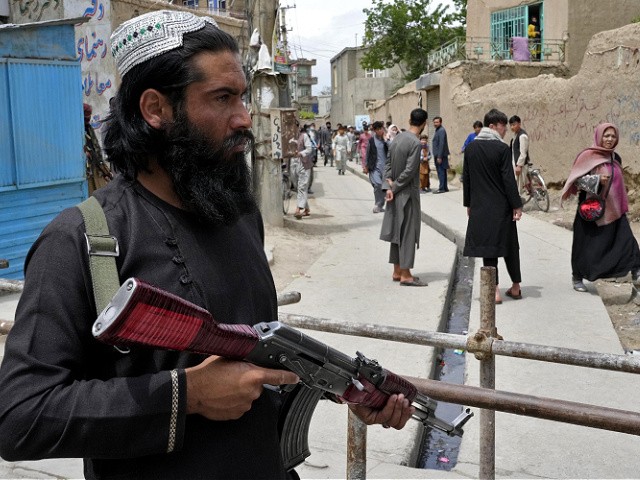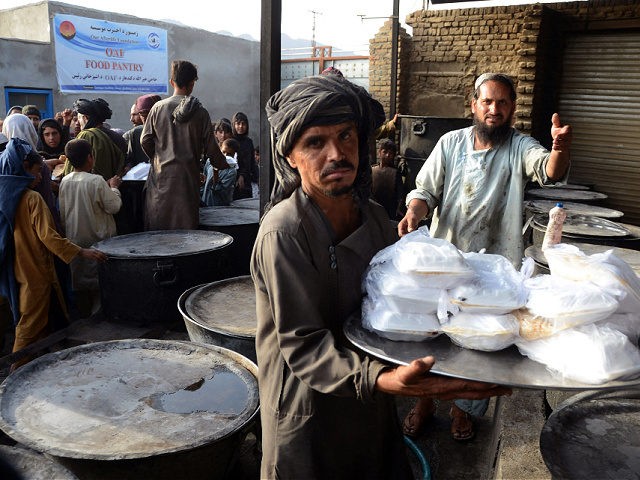Afghan news outlets Khaama Press and Ariana News reported on Thursday that an estimated 97 percent of citizens in the country are currently suffering the effects of food shortages, citing the United Nations.
Afghanistan has been an impoverished country for decades, first under the initial rule of the Taliban terrorist organization in the 1990s and during the 20-year war with America in the decade following. In August 2021, the Taliban returned to power shortly after President Joe Biden broke a deal with the Taliban to leave the country by May of that year, prompting a national campaign to return to power that ended with then-President Ashraf Ghani fleeing and handing Kabul over to the Taliban leadership.
The Taliban’s return prompted organizations like the World Bank and International Monetary Fund (IMF) to freeze Afghan government funds to prevent them from falling into the jihadists’ hands. United Nations agencies like the World Food Programme (WFP) took care not to publicly embrace the Taliban but insisted on continuing to hand aid over to the country. Reports out of Afghanistan since August suggest that Taliban jihadists have misappropriated that funding and used it as leverage for forced labor.
Taliban leaders have spent the entirety of their time in power demanding that the rest of the world fund their success, either through business investment or humanitarian aid. They have promised to respect human rights but only within their fundamentalist interpretation of sharia, or Islamic law, and have failed to meet basic demands from the international community such as letting girls attend school.
“After the prior government collapsed and the Islamic Emirate of Afghanistan (IEA) took control in August, millions of Afghans are now facing severe food shortages. According to the United Nations, food shortages affect 97 percent of Afghans,” Khaama Press reported on Thursday, calling Eid al-Fitr, last week’s holiday celebrating the end of the Muslim holy month of Ramadan, “just another day of struggle to feed their families.”
“Over than 22 million people, or more than half of the country’s population, are suffering from severe hunger, according to the United Nations World Food Program, with the majority unable to anticipate when their next meal will arrive,” Khaama continued. “This represents a considerable increase from September 2020, when over 14 million people were on the brink of starvation. According to the organisation, 97 percent of the population consumed insufficient food in December, and they were resorting to deal with the situation such as skipping meals.”
Ariana News cited humanitarian workers in the region as lamenting that the arrival of the Taliban caused major displacement of civilians — people fleeing the Taliban fearing the jihadists would kill them — that worsened what was already a humanitarian crisis.
“When it comes to food shortages, it is so much worse than we can see,” Noorain Noorani, the executive director of The Zahra Foundation, was quoted as saying in the outlet.
The office of the Special Inspector General for Afghanistan Reconstruction (SIGAR) recently released a report similarly warning of the dire circumstances Afghan civilians are currently living through. As the Afghan media outlet Tolo News observed on Friday, the report found that “70 percent of the Afghans are unable to provide their basic needs.”

A Taliban fighter stands guard at the site of an explosion in front of a school, in Kabul, Afghanistan, Tuesday, April 19, 2022. (AP Photo/Ebrahim Noroozi)
In September, shortly after the Taliban’s return to Kabul, the United Nations Development Program predicted that “as much as 97 percent of the population is at risk of sinking below the poverty line unless a response to the country’s political and economic crises is urgently launched.”
“Half of the population is already in need of humanitarian support. This analysis suggests that we are on course for rapid, catastrophic deterioration in the lives of Afghanistan’s most vulnerable people,” Kanni Wignaraja, U.N. Assistant Secretary-General and UNDP Director of the Regional Bureau for Asia and the Pacific, said at the time, discussing the U.N. report that made the finding.
“Over the coming six months, humanitarian organizations project increases in severe food insecurity, drought, waterborne disease outbreaks, and a marked deterioration of conditions in urban areas,” SIGAR predicted in the report, published on April 30. “The onset of spring traditionally brings relief from food shortages; however, with Afghanistan in the grips of the worst drought in three decades, below average winter precipitation means the spring harvest is unlikely to improve food security for vulnerable families.”
The issue has not been one of lack of humanitarian aid. As the SIGAR report documents, the United States remains the largest humanitarian aid donor to Afghanistan in the world.
“On March 31, 2022, the United States pledged more than $204 million in humanitarian assistance for the people of Afghanistan. This is in addition to $308 million announced on January 11,” SIGAR noted.
The U.N., through agencies like the WFP, has also collaborated with the Taliban to hand over aid. The WFP released $1 billion in aid to Afghanistan in March. The Security Council has also voted to expand support to Afghanistan, even as the U.N. refuses to acknowledge the Taliban as the government of Afghanistan, and the international coalition voted in March to work with “all relevant Afghan political actors” — a group consisting almost entirely of members of the Taliban — to aid the country’s reconstruction and bid for peace.
Taliban “Supreme Leader” Hibatullah Akhundzada appeared to declare victory in Afghanistan’s war on poverty and instability in remarks this weekend acknowledging Eid, published on the same day that he made a rare in-person appearance at a mosque in Kandahar, a traditional Taliban stronghold.
“I am immensely grateful to Almighty Allah that we are celebrating Eid-ul-Fitr this year at a time while our country is completely free of foreign invasion,” the statement read, according to a translation published online by Taliban spokesman Zabihullah Mujahid. “The long lasting and devastating war has finally ended and now under the shade of Islamic rule, the ground has been prepared for a peaceful and prosperous life in Afghanistan.”

COMMENTS
Please let us know if you're having issues with commenting.